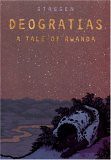Deogratias, A Tale of Rwanda by J. P. Stassen translated by Alexis Siegal
Deogratias is a boy who knows two hot sisters, so when the older rejects him, he'll go for the younger. Just a teenage boy, trying to get some action, like teenage boys everywhere.
But that was then, before. This is now, after.
After the genocide. After the brutal murder of those hot sisters, who were Tutsi. That was then, when he was just a boy, a Hutu boy.
Now, at night, he sees the dogs eating the bodies, he sees the insides of their bellies rise up and dissolve into stars. Now, at night, he is a dog, unless he can get some Urwagwa (banana beer) to hold the madness at bay, for at least another night.
This is less a tale of what happened then, but more what happens now, to the survivors, to the guilty, to the multitudes of guilty. To those guilty of crimes. To those guilty of surviving when those he cared most about didn't.
The graphic novel format, with Deogratias now and flashing back to then is potent. The graphic representation of this madness conveys things differently than words could. It also makes the flashbacks more powerful as the clues that we've switched times are visual, not textual.
Not an easy read, by any means, Stassen has no love in his heart for the role played by the French, as shown in his portrayal of the boorish French army sergeant, who has returned to Rwanda as a tourist.
The introductory notes by Siegal are invaluable in placing things in context, as the book touches on lesser details that many of us who only know the popular news coverage never picked up.

